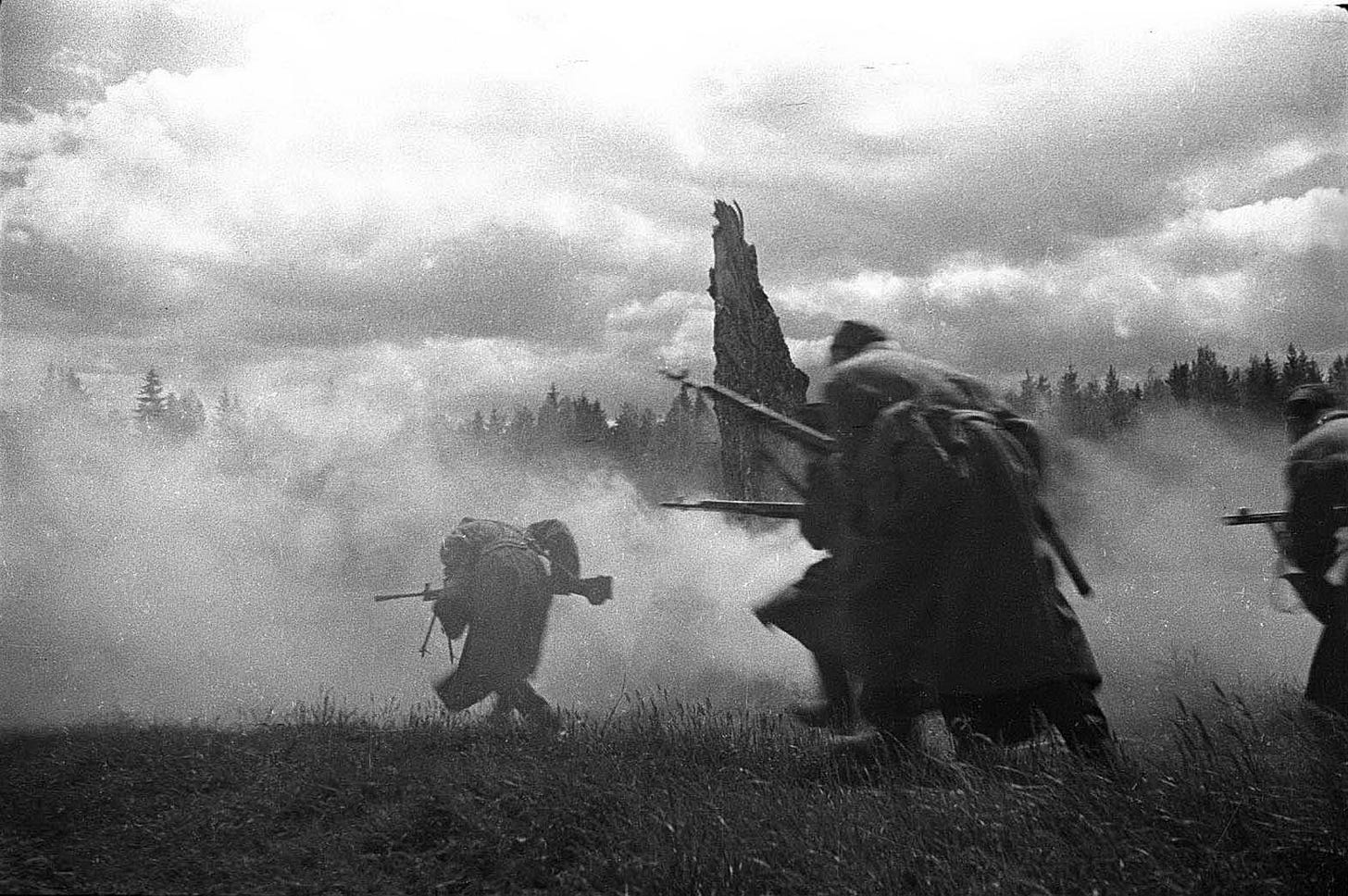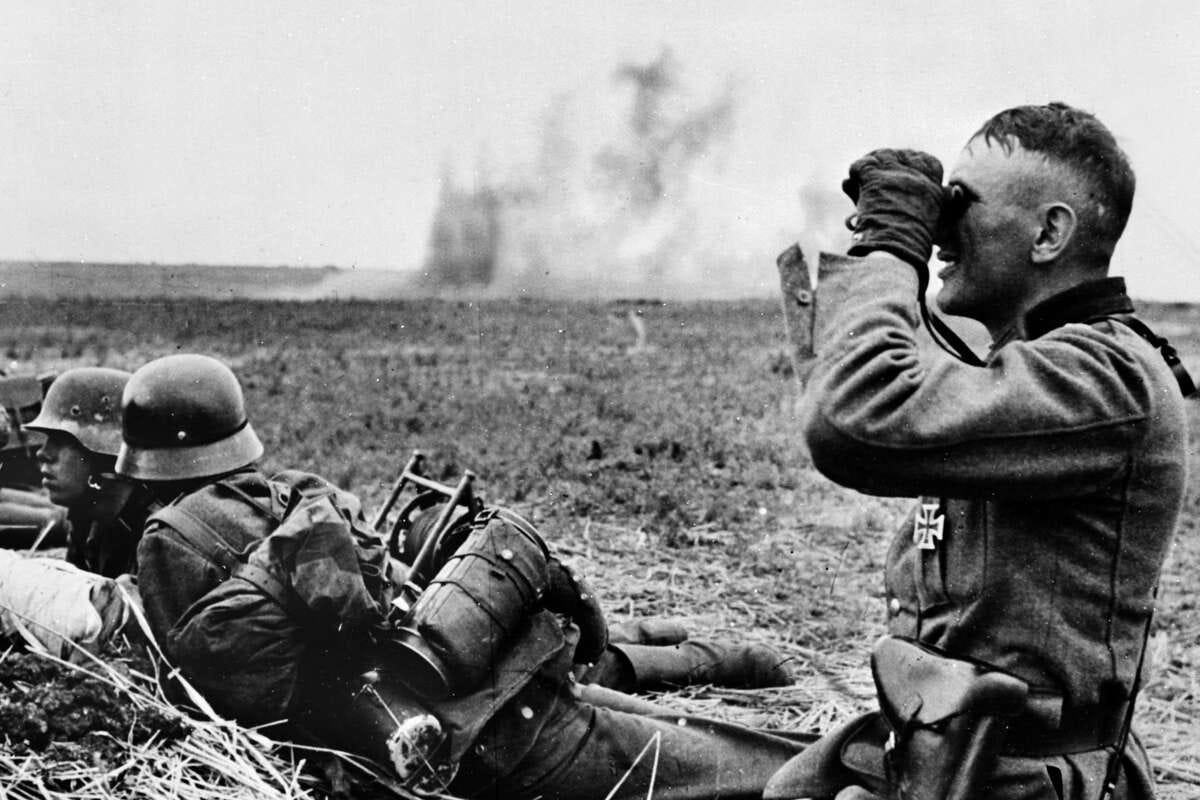Ernst Jünger: from 'Conservative Revolutionary' to Sluggishly Liberal & Humanistic - Julius Evola
Critical commentary from Julius Evola on Ernst Jünger’s later work. It is severe, but I think worth considering as it could spark discussions on the important question of spirit in our age.
The other work I completed in this period was The Figure of the 'Worker' in the Thought of Ernst Jünger (L’operaio' nel pensiero di Ernst Jünger), which was published in 1960 by the editor A. Armando (head of the publishing house ‘Avio’). Someone had drawn my attention to a book published in the years between the two World Wars, a book entitled The Worker: Dominion and Gestalt (Der Arbeiter: Herrschaft und Gestalt). Its author, Ernst Jünger, was already well-known at the time thanks to various works which - by contrast to the defeatist and pacifist literature prevalent in the aftermath of the war - emphasized the potentially positive and spiritual aspects of modern warfare. On this account, Jünger had even been labelled the 'anti-Remarque'. Nor was Jünger a mere writer: having joined the Foreign Legion in his youth, he had later volunteered to fight in the First World War, where he was repeatedly wounded and was awarded the highest military honors. Following the collapse of Imperial Germany, Jünger was held in high esteem in nationalist and combat circles, and soon emerged as one of the representatives of the ‘Conservative Revolution' - the term I already used to describe those circles which I came to appreciate and collaborate with in central Europe.
The starting point of Jünger's analysis in The Worker is the fact that modern warfare has unleashed elementary forces (where 'elementary forces' is used as it might be when talking of nature). Such elementary forces, Jünger argues, are related to that which is 'material'; i.e., to technical devices possessing an enormous destructive power (here the author speaks of 'material battles'). In the case of modern warfare, it is as if a non-human force had been awakened by man from which the individual soldier cannot escape: a force he must rather face by attempting to stand up to the very machines he serves, spiritually as well as physically. This is only possible if the individual takes on a new form of being by forging a new human type capable of grasping the absolute meaning of existence in a context that would prove destructive for any other person. In order to achieve such a goal, the character, ideals, myths, values and worldview of the bourgeois world must be transcended.
Jünger had sought to apply his analysis of modern 'total war' to the context of modern existence in general: for the rise of technology and mechanization, Jünger argued - and the various phenomena which this rise entails - will lead to a similar unleashing of 'elementary forces' and destructive, frightening processes, whereby the tools of science and technology, which man has created to conquer nature, will backfire. Jünger here examined similar issues to those he had examined with regard to modern warfare. Having ascertained the impossibility both of relying on previous norms and values, and of avoiding the process underway, Jünger pointed to the need for developing a new human type capable of actively facing destruction: capable, that is, of being the perpetrator rather than the victim of destruction. Destruction, according to Jünger, would thus have to be accepted as a means to overcome what is merely human: as the means to attain a new 'heroic sense of reality' which would replace hedonism and the pursuit of happiness as the chief driving force of life. This heroic sense of reality and impersonality would contribute to differentiate humanity once more, while transcending the antitheses and problems of the bourgeois world and its degenerate features. The new type of man destined to stand out physically from the rest as a new 'figure' in world history - a figure destined to act as the centre, foundation and ruler of the technical age - Jünger termed the 'worker' (der Arbeiter) - hence the title of his book. No doubt, Jünger ought to have chosen a better term, for his 'worker' does not describe a social class - the working class - nor does it have anything to do with the Leftist idea of the industrial proletariat. Rather, Jünger's term 'worker' refers to a broad human type which shares certain traits with both the ascetic and the warrior, and affirms its way of being with detachment and clarity in all aspects of life. In his book, Jünger describes the present age as an age of transition (something, he suggests, in between a museum and a construction yard), and outlines various prospects for the future role of the 'worker', not least in the realm of politics. Jünger here defends the ideal of hierarchy and talks in terms of a new Order. As this Order is described by Jünger as being both 'Spartan' and Prussian, as reminiscent of both the Jesuits and the Communist elites, it is clear that what the author has in mind are the values that have surfaced in the past, and are surfacing today among movements which are situated on the opposite side of the political spectrum, yet share a rejection of bourgeois and democratic values.
I had long wished to make Jünger's book known in Italy by publishing its translation. Yet in reading Jünger's work again, I realized that a mere translation would not have sufficed: for the book mixes many interesting sections with others that might confuse the inexperienced reader (for they refer to certain past events in Germany, while lacking any reference to other issues of dramatic importance for the present). Besides, Jünger's book presented certain editorial difficulties. I therefore abandoned the idea of a mere translation and opted for a synthesis of Jünger's theories. While I made extensive use of Jünger's own writing in my study, in order to develop a more critical and interpretive framework, I avoided quoting the extraneous or spurious parts of Jünger's book, and attempted to emphasize its most essential and relevant points. As for my own critical contribution to Jünger's theory, I pointed out that the sense of euphoria and prosperity that pervades the 'Western' world today would seem to have deprived the figure of the 'worker' of those alarming conditions necessary to its affirmation. And yet, I noted, there is no doubt another side to our 'Atomic Age' or 'Second Industrial Revolution': for the times of peace we are living in show all the signs of being an armistice. Besides, the necessary conditions for the rise of the 'worker' will continue to exist not externally, but in the form of internal acts of destruction and elementary forces in revolt against the current order (particularly if this order has been rationally, perfectly planned). If I ever criticized Jünger in my book, it was rather for his ambivalent description of the 'worker': for such a figure runs the risk of merely expressing a form of activism and self-development devoid of any transcendent character capable of engendering new and legitimate hierarchies. On the other hand, the attainment of a superior dimension of this kind is not a likely prospect; for the younger generations are increasingly coming to reflect the kind of worldview and perspective favored by modern science: a perspective that lies at the basis of modern technology (and thus of our own twilight civilization), and which denies the very possibility of transcendence.
In The Worker (as well as in a more recent book entitled At the Wall of Time), Jünger has mentioned the as-yet unperceived 'metaphysics' that lie at the basis of the world of machines and technology, and that will one day surface and come to prevail. Other authors have recently voiced similar ideas: a notable example is that of Pauwels and Bergier in Le matin des magiciens - a book that has attracted quite a lot of attention. Similar ideas, however, strike me as mere whims - unless the term 'metaphysical' is here understood in its literal meaning of 'that which lies beyond the physical' - in which case the emergence of non-physical forces might be seen to refer to the affirmation of a mechanistic and technological world: a 'daemonic' rather than truly 'metaphysical' event. Thus, in the conclusion to my book on Jünger's theories, I suggested that without an actual 'mutation' - in the sense the word possesses in the field of biology and genetics, where it refers to the development of new species - the figure of the 'worker', provided it ever comes into being, will hardly prove any different from the Communist ideal of the worker in materialist and collectivist terms. Here, I also remarked that the very use of the term 'worker' is questionable, for the idea of the 'worker' chiefly pertains to the fourth and final caste. It is revealing, therefore, that 'job' is a term so frequently used today that it even describes - and hence debases - activities which have nothing to do with the idea of a job - something I frequently emphasized in my own writing.
On the other hand, over the years Jünger has come to distance himself from the book I had introduced to the Italian public, and has abandoned his original views. While the most recent writing of Jünger has significantly contributed towards his fame as a writer and man of letters, on a spiritual level it reflects a lapse: both for its merely literary and aesthetic nature, and because it betrays the influence of ideas of a different, and often antithetical sort from the ones that inform The Worker and other early books of Jünger. It is as if the spiritual drive that Jünger had derived from his life in the trenches of the First World War, and applied on an intellectual level, had gradually run out. Besides, not only did Jünger play no significant role during the Second World War, but it also appears that, when in service in occupied France, he got in touch with those members of the Wehrmacht who in 1944 attempted to murder Hitler. Jünger, therefore, should be numbered among those individuals who first subscribed to 'Conservative Revolutionary' ideas but were later, in a way, traumatized by the National Socialist experience, to the point of being led to embrace the kind of sluggishly liberal and humanistic ideas which conformed to the dominant attempt 'to democratically reform' their country; individuals who have proven incapable of distinguishing the positive side of past ideas from the negative, and of remaining true to the former. Alas, this incapability to discern is, in a way, typical of contemporary Germany (the land of the 'economic miracle').
The following book I wrote, Ride the Tiger, partly returns to the issue of the 'worker', which it develops and integrates. [...]
JULIUS EVOLA






"Jünger, therefore, should be numbered among those individuals who first subscribed to 'Conservative Revolutionary' ideas but were later, in a way, traumatized by the National Socialist experience, to the point of being led to embrace the kind of sluggishly liberal and humanistic ideas which conformed to the dominant attempt 'to democratically reform' their country; individuals who have proven incapable of distinguishing the positive side of past ideas from the negative, and of remaining true to the former."
Wow, that is quite biting. Thanks for sharing.
I'm enjoying jüngers brothers writing more lately " it's great